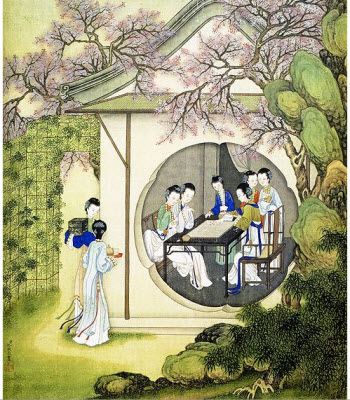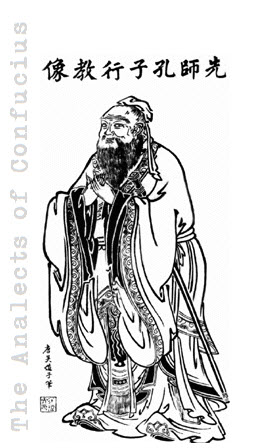Find the complete text of the Analects of Confucius.

BOOK XIII
Answers on the Art of Governing — Consistency
Tsz-lu was asking about government. "Lead the way in it," said the
Master, "and work hard at it."
Requested to say more, he added, "And do not tire of it."
Chung-kung, on being made first minister to the Chief of the Ki family, consulted the Master about government, and to him he said, "Let the heads of offices be heads. Excuse small faults. Promote men of sagacity and talent."
"But," he asked, "how am I to know the sagacious and talented, before promoting them?"
"Promote those whom you do know," said the Master.
"As to those of whom you are uncertain, will others omit to notice them?"
Tsz-lu said to the Master, "As the prince of Wei, sir, has been waiting for you to act for him in his government, what is it your intention to take in hand first?"
"One thing of necessity," he answered—"the rectification of terms."
"That!" exclaimed Tsz-lu. "How far away you are, sir! Why such rectification?"
"What a rustic you are, Tsz-lu!" rejoined the Master. "A gentleman would be a little reserved and reticent in matters which he does not understand. If terms be incorrect, language will be incongruous; and if language be incongruous, deeds will be imperfect. So, again, when deeds are imperfect, propriety and harmony cannot prevail, and when this is the case laws relating to crime will fail in their aim; and if these last so fail, the people will not know where to set hand or foot. Hence, a man of superior mind, certain first of his terms, is fitted to speak; and being certain of what he says can proceed upon it. In the language of such a person there is nothing heedlessly irregular—and that is the sum of the matter."
Fan Ch'i requested that he might learn something of husbandry. "For that." said the Master, "I am not equal to an old husbandman." Might he then learn something of gardening? he asked. "I am not equal to an old gardener." was the reply.
"A man of little mind, that!" said the Master, when Fan Ch'i had gone out. "Let a man who is set over the people love propriety, and they will not presume to be disrespectful. Let him be a lover of righteousness, and they will not presume to be aught but submissive. Let him love faithfulness and truth, and they will not presume not to lend him their hearty assistance. Ah, if all this only were so, the people from all sides would come to such a one, carrying their children on their backs. What need to turn his hand to husbandry?
"Though a man," said he, "could hum through the Odes—the three hundred—yet should show himself unskilled when given some administrative work to do for his country; though he might know much of that other lore, yet if, when sent on a mission to any quarter, he could answer no question personally and unaided, what after all is he good for?
"Let a leader," said he, "show rectitude in his own personal character, and even without directions from him things will go well. If he be not personally upright, his directions will not be complied with."
Once he made the remark, "The governments of Lu and of Wei are in brotherhood."
Of King, a son of the Duke of Wei, he observed that "he managed his household matters well. On his coming into possession, he thought, 'What a strange conglomeration!'—Coming to possess a little more, it was, 'Strange, such a result!' And when he became wealthy, 'Strange, such elegance!'"
The Master was on a journey to Wei, and Yen Yu was driving him. "What multitudes of people!" he exclaimed. Yen Yu asked him, "Seeing they are so numerous, what more would you do for them?"
"Enrich them," replied the Master.
"And after enriching them, what more would you do for them?"
"Instruct them."
"Were any one of our princes to employ me," he said, "after a twelvemonth I might have made some tolerable progress;"
Again, "How true is that saying, 'Let good men have the management of a country for a century, and they would be adequate to cope with evil-doers, and thus do away with capital punishments,'"
Again, "Suppose the ruler to possess true kingly qualities, then surely after one generation there would be good-will among men."
Again, "Let a ruler but see to his own rectitude, and what trouble will he then have in the work before him? If he be unable to rectify himself, how is he to rectify others?"
Once when Yen Yu was leaving the Court, the Master accosted him. "Why so late?" he asked. "Busy with legislation," Yen replied. "The details of it," suggested the Master; "had it been legislation, I should have been there to hear it, even though I am not in office."
Duke Ting asked if there were one sentence which, if acted upon, might have the effect of making a country prosperous.
Confucius answered, "A sentence could hardly be supposed to do so much as that. But there is a proverb people use which says, 'To play the prince is hard, to play the minister not easy.' Assuming that it is understood that 'to play the prince is hard,' would it not be probable that with that one sentence the country should be made to prosper?"
"Is there, then," he asked, "one sentence which, if acted upon, would have the effect of ruining a country?"
Confucius again replied, "A sentence could hardly be supposed to do so much as that. But there is a proverb men have which says, 'Not gladly would I play the prince, unless my words were ne'er withstood.' Assuming that the words were good, and that none withstood them, would not that also be good? But assuming that they were not good, and yet none withstood them, would it not be probable that with that one saying he would work his country's ruin?"
When the Duke of Sheh consulted him about government, he replied, "Where the near are gratified, the far will follow."
When Tsz-hiá became governor of Kü-fu, and consulted him about government, he answered, "Do not wish for speedy results. Do not look at trivial advantages. If you wish for speedy results, they will not be far-reaching; and if you regard trivial advantages you will not successfully deal with important affairs."
The Duke of Sheh in a conversation with Confucius said, "There are some straightforward persons in my neighborhood. If a father has stolen a sheep, the son will give evidence against him."
"Straightforward people in my neighborhood are different from those," said Confucius. "The father will hold a thing secret on his son's behalf, and the son does the same for his father. They are on their way to becoming straightforward."
Fan Ch'i was asking him about duty to one's fellow-men. "Be courteous," he replied, "in your private sphere; be serious in any duty you take in hand to do; be leal-hearted in your intercourse with others. Even though you were to go amongst the wild tribes, it would not be right for you to neglect these duties."
In answer to Tsz-kung, who asked, "how he would characterize one who could fitly be called 'learned official,'" the Master said, "He may be so-called who in his private life is affected with a sense of his own unworthiness, and who, when sent on a mission to any quarter of the empire, would not disgrace his prince's commands."
"May I presume," said his questioner, "to ask what sort you would put next to such?"
"Him who is spoken of by his kinsmen as a dutiful son, and whom the folks of his neighborhood call' good brother.'"
"May I still venture to ask whom you would place next in order?"
"Such as are sure to be true to their word, and effective in their work—who are given to hammering, as it were, upon one note—of inferior calibre indeed, but fit enough, I think, to be ranked next."
"How would you describe those who are at present in the government service?"
"Ugh! mere peck and panier men!—not worth taking into the reckoning."
Once he remarked, "If I cannot get via media men to impart instruction to, then I must of course take the impetuous and undisciplined! The impetuous ones will at least go forward and lay hold on things; and the undisciplined have at least something in them which needs to be brought out."
"The Southerners," said he, "have the proverb, 'The man who sticks not to rule will never make a charm-worker or a medical man,' Good!—'Whoever is intermittent in his practise of virtue will live to be ashamed of it.' Without prognostication," he added, "that will indeed be so."
"The nobler-minded man," he remarked, "will be agreeable even when he disagrees; the small-minded man will agree and be disagreeable."
Tsz-kung was consulting him, and asked, "What say you of a person who was liked by all in his village?"
"That will scarcely do," he answered.
"What, then, if they all disliked him?"
"That, too," said he, "is scarcely enough. Better if he were liked by the good folk in the village, and disliked by the bad."
"The superior man," he once observed, "is easy to serve, but difficult to please. Try to please him by the adoption of wrong principles, and you will fail. Also, when such a one employs others, he uses them according to their capacity. The inferior man is, on the other hand, difficult to serve, but easy to please. Try to please him by the adoption of wrong principles, and you will succeed. And when he employs others he requires them to be fully prepared for everything."
Again, "The superior man can be high without being haughty. The inferior man can be haughty if not high."
"The firm, the unflinching, the plain and simple, the slow to speak," said he once, "are approximating towards their duty to their fellow-men."
Tsz-lu asked how he would characterize one who might fitly be called an educated gentleman. The master replied, "He who can properly be so-called will have in him a seriousness of purpose, a habit of controlling himself, and an agreeableness of manner: among his friends and associates the seriousness and the self-control, and among his brethren the agreeableness of manner."
"Let good and able men discipline the people for seven years," said the
Master, "and after that they may do to go to war."
But, said he, "To lead an undisciplined people to war—that I call throwing them away."
|
|
